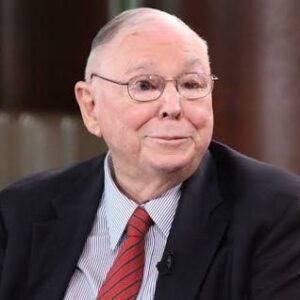

If you’ve followed the news today, you probably know that Warren Buffett’s friend and fellow investor Charlie Munger died today at age 99. That’s a nice long run.
I never met the man but I did have an interaction with him in 1981.
Warning: The whole rest of this will be about me, not him. So if you’re not interested in me, don’t read on.
In early 1981, I was following the turmoil in Poland closely. Someone had given a talk on Poland at Santa Clara University, where I was a visiting assistant professor in the economics department. I thought Poland would be an interesting place to be. In the speaker’s group was a young married Polish couple. I hit it off afterwards with the guy. I was single and feeling the need for adventure. I told him of my interest. He recommended that I contact a charity that Charlie Munger was involved with to apply for funds to go to Poland for a year.
I contacted the charity. I can’t remember whether I spoke to Charlie or an aide. I actually think it was Charlie. I would certainly remember if I had known just how big a player Charlie was, but there was a lot I didn’t know. Remember that this was about 15 years before Google. So either Charlie or his aide told me that the first step was for me to write an intellectual autobiography. That sounded like a neat idea, so I began.
Even though I had just bought an IBM Selectric typewriter, for some reason I decided to write long hand. I started thinking about my early childhood and the thoughts I had had about revenge (I was against it), theft (I was against it), honesty (I was for it), and other things. I talked about the particular experiences that led me there. After about 30 pages of writing, I had reached age 6. I realized that to do justice to the project, I would probably need to write well over 100 pages. And then who would read it? So I put the writing aside and didn’t apply. Was that a mistake? I don’t know. By staying around at SCU, I met my wife in the fall of 1981, when we were both teaching there. If I had gone to Poland, I wouldn’t have met her.
I still owe Charlie though. By writing that 30 pages, I ended up thinking of myself as being a more interesting person than I had previously thought. Without having done it, I might never have written The Joy of Freedom: An Economist’s Odyssey, which Milton Friedman called, in his blurb for the book, “a quasi-autobiographical clarion call for a free society.”

READER COMMENTS
Scott Sumner
Nov 28 2023 at 7:24pm
Nice post. Munger opposed the foolish US cold war against China:
https://www.axios.com/2023/05/06/berkshire-hathaway-annual-meeting-china
TMC
Nov 29 2023 at 8:45am
Scott, from your link: ”
Buffett likened U.S.-China tensions to the Cold War, where America stared down the Soviet Union under the threat of a nuclear conflict that would lead to “mutually assured destruction.”
That policy “kept a lot of things from happening…but Cuba was a close call,” Buffett said.”
Seems like likening it to the cold war justifies US-China’s tensions, given how that turned out.
I don’t see it as that bad, but more of an abusive relationship. It is mostly good, but the IP theft and other considerations make it clear that China deserves much of the animosity directed towards it.
David Henderson
Nov 29 2023 at 10:44am
Thanks, Scott. Yes, it’s good that he didn’t want to increase tensions with China.
Laurentian
Nov 29 2023 at 12:45am
https://www.reuters.com/business/finance/berkshires-munger-says-will-like-have-chinas-financial-structure-us-cnbc-2021-06-30/
He also defended China’s lockdowns and its treatment of Jack Ma.
David Henderson
Nov 29 2023 at 10:45am
Not good. Thanks for the cite.
Monte
Nov 29 2023 at 12:29pm
I know nothing of Charles Munger, other than his partnership with Buffett and what little has been made public about his private life. Strangely, his passing reminds me of the Dicken’s character, Jacob Marley. Considered “one of the great minds of the 20th century”, Munger was a good man of business and gave generously to universities, but what specifically did he ever do for the poor?
I wonder (as I do about myself) what chain he forged in life that he must now bear in death “doomed to wander through the world…and witness what [he] cannot share, but might have shared on earth, and turned to happiness!”
David Henderson
Nov 29 2023 at 12:43pm
You write:
That one’s easy to answer. By creating wealth he made the capital stock higher than otherwise. That made for higher productivity, which led to higher real wages, and higher output, which benefited consumers. I recommend that you read the famous Bastiat essay on the seen and the unseen, especially this part.
Monte
Nov 29 2023 at 12:57pm
Thanks, David. I agree with what you say, I’m just curious if that was Munger’s intent, or “without intending it, without knowing it, [he] advanced the interest of the society.”
I’ll read Bastiat’s essay as soon as I get a chance. Have a good day.
Monte
Nov 29 2023 at 8:42pm
From Bastiat’s “Political Economy In One Lesson”, Ch. IX: Thrift and Luxury:
We might say that, in their final effects, this accurately describes the actions of both Jacob Marley and Charlie Munger, may they both RIP.
Thanks for the reference.
Comments are closed.